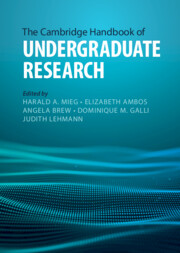Book contents
- The Cambridge Handbook of Undergraduate Research
- The Cambridge Handbook of Undergraduate Research
- Copyright page
- Contents
- Figures
- Tables
- Contributors
- Foreword
- Foreword
- 1 Introduction
- Part I Theory and Research on Undergraduate Research
- Part II Implementation, Approaches, Methods
- Part III Disciplines
- Part IV International Perspective
- 47 Introduction
- Part IV.1 Americas
- Part IV.2 Africa & Middle East
- Part IV.3 Asia & Oceania
- Part IV.4 Europe
- 64 Undergraduate Research in Austria
- 65 Undergraduate Research in France
- 66 Undergraduate Research in Germany
- 67 Undergraduate Research in Italy
- 68 Undergraduate Research in the Netherlands
- 69 Undergraduate Research in Portugal
- 70 Undergraduate Research in Russia
- 71 Undergraduate Research in Scandinavia
- 72 Undergraduate Research in the UK
- Part V Avenues for Developing Undergraduate Research
- Index
- References
66 - Undergraduate Research in Germany
A Renewed Tribute to Wilhelm von Humboldt
from Part IV.4 - Europe
Published online by Cambridge University Press: 11 August 2022
- The Cambridge Handbook of Undergraduate Research
- The Cambridge Handbook of Undergraduate Research
- Copyright page
- Contents
- Figures
- Tables
- Contributors
- Foreword
- Foreword
- 1 Introduction
- Part I Theory and Research on Undergraduate Research
- Part II Implementation, Approaches, Methods
- Part III Disciplines
- Part IV International Perspective
- 47 Introduction
- Part IV.1 Americas
- Part IV.2 Africa & Middle East
- Part IV.3 Asia & Oceania
- Part IV.4 Europe
- 64 Undergraduate Research in Austria
- 65 Undergraduate Research in France
- 66 Undergraduate Research in Germany
- 67 Undergraduate Research in Italy
- 68 Undergraduate Research in the Netherlands
- 69 Undergraduate Research in Portugal
- 70 Undergraduate Research in Russia
- 71 Undergraduate Research in Scandinavia
- 72 Undergraduate Research in the UK
- Part V Avenues for Developing Undergraduate Research
- Index
- References
Summary
In Germany, learning through research has experienced a great upswing in the last decade, especially through project funding and research within the framework of the national “Quality Pact for Teaching” (QPL, Qualitätspakt Lehre). Forschendes Lernen – as the concept is called in German – was developed in Germany about fifty years ago. In the last twenty years, this teaching and learning concept has been adapted to current conditions and challenges through the commitment and creative ideas of various university players. Forschendes Lernen became the foundation for undergraduate research in Germany.
Keywords
- Type
- Chapter
- Information
- The Cambridge Handbook of Undergraduate Research , pp. 599 - 606Publisher: Cambridge University PressPrint publication year: 2022

